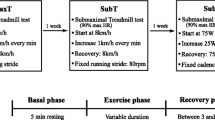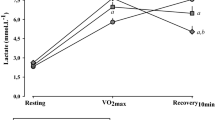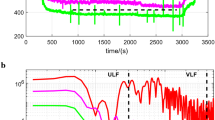Abstract
The rhythmic components of heart rate variability (HRV) can be separated and quantitatively assessed by means of power spectral analysis. The powers of high frequency (HF) and low frequency (LF) components of HRV have been shown to estimate cardiac vagal and sympathetic activities. The reliability of these spectral indices, as well as that of LF/HF ratio as a marker of autonomic interaction at rest and during exercise, is briefly reviewed. Modifications in autonomic activities induced by different physiological conditions, e.g. hypoxia exposure, training, and water immersion, have been found in HRV power spectra at rest. The changes in HF and LF powers and in LF/HF ratio observed during exercise have been shown not to reflect the decrease in vagal activity and the activation of sympathetic system occurring at increasing loads. HF peak was recognised in power spectra in the entire range of relative intensity, being responsible for the most part of HR variability at maximal load. LF power did not change during low intensity exercise and decreased to negligible values at medium–high intensity, where sympathetic activity was enhanced. There was no influence from factors such as fitness level, age, hypoxia, and blood distribution. In contrast, a dramatic effect of body position has been suggested by the observation that LF power increased at medium–high intensities when exercising in the supine position. The increased respiratory activity due to exercise would be responsible of HF modulation of HR via a direct mechanical effect. The changes in LF power observed at medium–high intensity might be the expression of the modifications in arterial pressure control mechanisms occurring with exercise. The finding of opposite trends for LF rhythm in supine and sitting exercises suggests that different readjustments might have occurred in relation to different muscular inputs in the two positions.





Similar content being viewed by others
References
Arai Y, Saul JP, Albrecht P, Hartley LH, Lilly LS, Cohen RJ, Colucci WS (1989) Modulation of cardiac autonomic activity during and immediately after exercise. Am J Physiol 256:H132–H141
Baselli G, Cerutti S, Interdonato T, Orizio C, Perini R, Veicsteinas A (1989) Heart rate variability during exercise in sedentary subjects and athletes. In: Proceedings of Computers in Cardiology. IEEE Computer Society, Washington, D.C., pp 319–322
Bernardi L, Salvucci F, Suardi R, Soldà PL, Calciati A, Perini S, Falcone C, Ricciardi L (1990) Evidence for an intrinsic mechanism regulating heart rate variability in the transplanted and in the intact heart during submaximal dynamic exercise? Cardiovasc Res 24:969–981
Camm AJ, Malik M, Bigger JT, Brethardt G, Cerutti S, Cohen RJ, Coumel P, Fallen EL, Kennedy HL, Kleiger RE, Lombardi F, Malliani A, Moss AJ, Rottman JN, Schmidt G, Schwartz PJ, Singer D (1996) Heart rate variability. Standards of measurements, physiological interpretation, and clinical use. Circulation 93:1043–1065
Casadei B, Cochrane S, Johnston J, Conway J, Sleight P (1995) Pitfalls in the interpretation of spectral analysis of the heart rate variability during exercise in humans. Acta Physiol Scand 153:125–131
Casadei B, Moon J, Johnston J, Caiazza A, Sleight P (1996) Is respiratory sinus arrhythmia a good index of cardiac vagal tone in exercise? J Appl Physiol 81:556–564
Dixon EM, Kamath MV, McCartney N, Fallen EL (1992) Neural regulation of heart rate variability in endurance athletes and sedentary controls. Cardiovasc Res 26:713–719
Eckberg DL (1997) Sympatho-vagal balance. A critical appraisal. Circulation 96:3224–3232
Folkow B, Haglund U, Jodal M, Lundgren O (1971) Blood flow in the calf muscle of man during heavy rhythmic exercise. Acta Physiol Scand 81:157–163
Gonzales-Camarena R, Carrasco-Sosa S, Roman-Ramos R, Gaitan-Gonzales MJ, Medina-Banuelos V, Azpiroz-Leehan J (2000) Effect of static and dynamic exercise on heart rate and blood pressure variabilities. Med Sci Sports Exerc 32:1719–1728
Hagerman I, Berglund M, Lorin M, Nowak J, Sylven C (1996) Chaos-related deterministic regulation of heart rate variability in time and frequency domains: effects of autonomic blockade and exercise. Cardiovasc Res 31:410–418
Hughson RL, Yamamoto Y, McCullough RE, Sutton JR, Reeves JT (1994) Sympathetic and parasympathetic indicators of heart rate control at altitude studied by spectral analysis. J Appl Physiol 77:2537–2542
Huikiri HV, Pikkujamsa SM, Airaksinen KEJ, Ikaheimo MJ, Rantala AO, Kauma H, Lilja M, Kesaniemi A (1996) Sex-related differences in autonomic modulation of heart rate in middle-aged subjects. Circulation 94:122–125
Jasson S, Medigue C, Maison-Blanche P, Montano N, Meyer L, Verneiren C, Mansier P, Coumel P, Malliani A, Swynghedauw B (1997) Instant power spectrum analysis of heart rate variability during orthostatic tilt using a time/frequency-domain method. Circulation 96:3521–3526
Kamath MV, Fallen EL (1993) Power spectral analysis of heart rate variability: a non invasive signature of cardiac autonomic function. Crit Rev Biomed Eng 21:245–311
Kamath MV, Fallen EL, McKelvie R (1991) Effects of steady state exercise on the power spectrum of heart rate variability. Med Sci Sports Exerc 23:428–434
Lakatta EG (1993) Cardiovascular regulatory mechanisms in advanced age. Physiol Rev 73:413–467
Lipsitz LA, Mietus J, Moody GB, Goldberger AL (1990) Spectral characteristics of heart rate variability before and during postural tilting. Relation to aging and risk of syncope. Circulation 81:1803–1810
Macor F, Fagard R, Amery A (1996) Power spectral analysis of RR interval and blood pressure short-term variability at rest and during dynamic exercise: comparison between cyclists and controls. Int J Sports Med 17:175–181
Melanson EL (2000) Resting heart rate variability in men varying in habitual physical activity. Med Sci Sports Exerc 32:1894–1901
Nakamura Y, Yamamoto Y, Muraoka I (1993) Autonomic control of heart rate during physical exercise and fractal dimension of heart rate variability. J Appl Physiol 74:875–881
O'Leary DS (1996) Heart rate control during exercise by baroreceptors and skeletal muscle afferents. Med Sci Sports Exerc 28:210–217
Orizio C, Perini R, Comandè A, Castellano M, Beschi M, Veicsteinas A (1988) Plasma catecholamines and heart rate at the beginning of muscular exercise in man. Eur J Appl Physiol 57:644–651
Pagani M, Lombardi F, Guzzetti S, Rimoldi O, Furlan R, Pizzinelli P, Sandrone G, Malfatto G, Dell'Orto S, Piccaluga E, Turiel M, Baselli G, Cerutti S, Malliani A (1986) Power spectral analysis of heart rate and arterial pressure variabilities as a marker of sympatho–vagal interaction in man and conscious dog. Circ Res 59:178–193
Perini R, Orizio C, Comandè A, Castellano M, Beschi M, Veicsteinas A (1989) Plasma norepinephrine and heart rate dynamics during recovery from submaximal exercise in man. Eur J Appl Physiol 58:879–883
Perini R, Orizio C, Baselli G, Cerutti S, Veicsteinas A (1990) The influence of exercise intensity on the power spectrum of heart rate variability. Eur J Appl Physiol 61:143–148
Perini R, Orizio C, Milesi S, Biancardi L, Baselli G, Veicsteinas A (1993) Body position affects the power spectrum of heart rate variability during dynamic exercise. Eur J Appl Physiol 66:207–213
Perini R, Milesi S, Biancardi L, Veicsteinas A (1996) Effects of high altitude acclimatisation on heart rate variability in resting humans. Eur J Appl Physiol 73:521–528
Perini R, Milesi S, Biancardi L, Pendergast DR, Veicsteinas A (1998) Heart rate variability in exercising humans: effect of water immersion. Eur J Appl Physiol 77:326–332
Perini R, Milesi S, Fisher NM, Pendergast DR, Veicsteinas A (2000) Heart rate variability during dynamic exercise in elderly males and females. Eur J Appl Physiol 82:8–15
Perini R, Fisher N, Veicsteinas A, Pendergast DR (2002) Aerobic training and cardiovascular responses at rest and during exercise in older men and women. Med Sci Sports Exerc 34:700–708
Rimoldi O, Furlan R, Pagani MR, Piazza S, Guazzi M, Pagani M, Malliani A (1992) Analysis of neural mechanisms accompanying different intensities of dynamic exercise. Chest 101 [Suppl 5]:226S–230S
Robinson BF, Epstein SE, Beiser GD, Braunwald E (1966) Control of heart rate by the autonomic nervous system. Studies in man on the interrelation between baroreceptor mechanisms and exercise. Circ Res 19:400–411
Rowell LB, O'Leary DS (1990) Reflex control of the circulation during exercise: chemoreflexes and mechanoreflexes. J Appl Physiol 69:407–418
Sayers BM (1973) Analysis of heart rate variability. Ergonomics 16:17–32
Saul JP (1990) Beat-to-beat variations of heart rate reflect modulation of cardiac autonomic outflow. News Physiol Sci 5:32–37
Seals DR, Taylor JA, Ng AV, Esler MD (1994) Exercise and aging: autonomic control of the circulation. Med Sci Sports Exerc 5:568–576
Terziotti P, Schena F, Gulli G, Cevese A (2001) Post-exercise recovery of autonomic cardiovascular control: a study by spectrum and cross-spectrum analysis in humans. Eur J Appl Physiol 84:187–194
Yamamoto Y, Hughson RL, Peterson JC (1991) Autonomic control of heart rate during exercise studied by heart rate variability spectral analysis. J Appl Physiol 71:1136–1142
Author information
Authors and Affiliations
Corresponding author
Rights and permissions
About this article
Cite this article
Perini, R., Veicsteinas, A. Heart rate variability and autonomic activity at rest and during exercise in various physiological conditions. Eur J Appl Physiol 90, 317–325 (2003). https://doi.org/10.1007/s00421-003-0953-9
Accepted:
Published:
Issue Date:
DOI: https://doi.org/10.1007/s00421-003-0953-9




